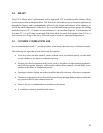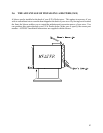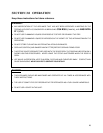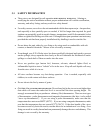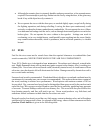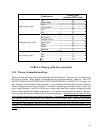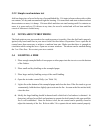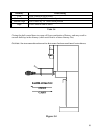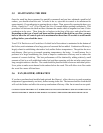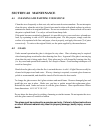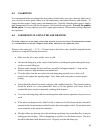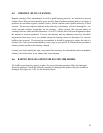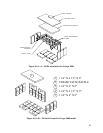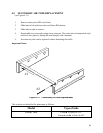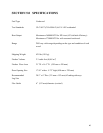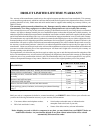34
3.5 MAINTAINING THE FIRE
Once the wood has been consumed (or partially consumed) and you have obtained a good bed of
embers, you should reload the unit. In order to do so, open the air control to its maximum for
approximately 15 seconds prior to opening the stove door. Then, proceed by opening the door very
slowly. Open it by 2” to 4” (52 to 104 mm) for 10 to 15 seconds before opening it completely. This
procedure will increase the draft and thus eliminate the smoke which is stagnant in a state of slow
combustion in the stove. Then, bring the red embers to the front of the stove and reload the unit.
Depending on the type of wood you burn and the strength of the draft in your flue, you may
have to leave the air control open to its maximum for more than 15 seconds to avoid smoke
spillage before you reload the stove.
Your E.P.A Drolet stove will work best if a thick bed of hot embers is maintained in the bottom of
the firebox, and a minimum of two large pieces of seasoned fuel are added. Combustion efficiency is
largely related to establishing a hot ember bed, and hot firebox temperatures. The quicker the stove
and chimney (flue) get up to normal operating temperatures, the better. A small intense fire is
preferred to a large smouldering fire, both to improve combustion efficiency and to reduce the
amount of creosote build-up. The best performance will be obtained by adding relatively small
amounts of fuel to a well established ember bed, and then operating with the air inlet control open
long enough to achieve a hot fire. The wood should be placed with air in between individual pieces.
Use a poker to make an air channel in the embers below the wood. This will allow air to flow under
the wood for a more efficient burn.
3.6 FAN (BLOWER) OPERATION
If you have purchased and installed and optional fan (blower), allow the stove to reach operating
temperature (approximately one hour), before turning on the fan. The increased airflow from the fan
will cool the firebox and affect the start-up combustion efficiency if the fan is turned on too quick.
CAUTION: ENSURE THAT THE FAN’S POWER CORD IS NOT IN CONTACT WITH ANY SURFACE OF THE TTOVE TO
PREVENT ELECTRICAL SHOCK OR FIRE DAMAGE. DO NOT RUN THE POWER CORD BENEATH THE STOVE.



